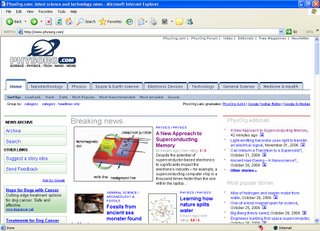Scientist J. Newcombe Hodges discusses coming developments in technology in his new book entitled A Primer for Tomorrow. The book begins with a history of technological development, moves into an introduction to quantum physics, gravity, electromagnetism, bio computers, and a commentary on our progress toward teleportation, anti-gravity, time travel, and the replication of the human body. He writes in an engaging manner, with the aim of igniting passion for science in the mind of the reader. He suggests some of the economic factors which tend to put the brakes on rapid technological change.
The author is offering this first book in a series as a free download, in Adobe Acrobat format, at his website. If you don’t have it on your computer, you may download the Adobe Acrobat Reader for free on this site as well.
http://www.tamashii.com/ When you reach the site, go to “Enter and Welcome to Tomorrow”. Next, click on “The Book”. There are full instructions about downloading the book to your computer.
Showing posts with label science. Show all posts
Showing posts with label science. Show all posts
Thursday, May 24, 2007
Monday, March 12, 2007
Are humans the product of off-world intervention?
After receiving a degree in psychology from Tulane University at New Orleans, Lloyd Pye trained with the U.S. Army as a Military Intelligence agent. Upon completion of his military career, Lloyd began research in anthropology, specializing in hominoids, which led him to the astonishing conclusion that humans could not have evolved on earth.
Lloyd published a book entitled Everything You Know Is Wrong—Book One: Human Origins, which proposes an Intervention Theory directly opposed to Darwinism, Creationism and Intelligent Design. He claims his theory is science based, supported by ancient historical records, puzzling details about megalithic structures located around the world, and recent discoveries about our own DNA.
Intriguing evidence: http://www.lloydpye.com/
Friday, March 02, 2007
The Classroom @ Sea Project: Drilling the Mid-Atlantic Ridge
Early in March, 2007, a team of scientists from Durham University, Cardiff University and the National Oceanography Centre, Southampton, will travel aboard the RRS James Cook to investigate an area of the Mid-Atlantic Ridge known as the Fifteen-Twenty Fracture Zone (FTFZ). The scientific team on board the ship is led by Prof. Roger Searle from University of Durham, Dr Chris MacLeod (University of Cardiff) and Dr Bramley Murton (NOCS).
Seismological research has determined that the FTFZ appears to be a gap in the crust of the Earth thousands of kilometers wide. The mantle, located in the interior of the planet, is typically covered by crust several kilometers thick. The crust thickness averages about 18 miles (30 kilometers) under the continents, but is only about 3 miles (5 kilometers) under the oceans. It is light and fragile. The mission will attempt to determine whether the ocean crust was dislodged by geological faults or never formed in that area.
This voyage of discovery has been designed as an interactive project for students. The site features a diary which, beginning March 5, 2007, will display accounts of onboard events of interest. The website includes informative modules describing the marine geology and biological environment. Teaching aids and reproducible worksheets are provided. In addition, the site gallery will contain photo highlights of the cruise. Students around the world will be able to e-mail members of the team and ask questions about the excursion.
Climb aboard: http://www.noc.soton.ac.uk/gg/classroom@sea/JC007/about.html
Labels:
science,
science lesson plans,
science news,
teacher resources
Monday, January 29, 2007
LiveScience: An entertaining review of science news items
LiveScience.com reports the latest in scientific research, with topics ranging from human and animal biology to the forces of Nature. What’s different about this website is that the items reported on the site are so unusual and intriguing, and are briefly described with a minimum of technical details.
Here are some examples of the topics on this site:
“Huge ‘ocean’ found underneath Asian continent”
“Antiviral paint kills flu on contact”
“10 amazing things you didn’t know about animals”
“Video: seeing machine for people with macular degeneration”
“Death disks: urban flying saucers designed for U.S. military”
“Garbage cans pack spy chips”
“Genetic upper class: could the human race split?”
“Military shows off new ray gun”
“Huge ‘printer’ would build a house in 24 hours”
“Robots get soft, human-like skin”
“Fish capable of human-like logic”
“Why bats are more efficient flyers than birds”
“Genetically-modified skin cells fight infection”
“Invisible mountains revealed under Greenland ice”
Awesome site! http://www.livescience.com/
Sunday, January 14, 2007
Science and astronomy: What will tonight’s sky look like?


Before I found this site, the night sky was mostly a mystery for me. I could pick out the North Star, and the Big and Little Dippers, but that was about it. This site provides diagrams every day of the upcoming night sky. Significant astronomical events, like the approach of a comet, are discussed in radio programs, available for listening or downloading.
The radio broadcast section contains more than astronomy information. Topics range from the poaching of wildlife in Africa to the migration routes of sea turtles.
Check out this site: http://www.earthsky.org/
The radio broadcast section contains more than astronomy information. Topics range from the poaching of wildlife in Africa to the migration routes of sea turtles.
Check out this site: http://www.earthsky.org/
Tuesday, January 09, 2007
ScienceDaily: The latest scientific research in digest form
The Science Daily home page has news in several scientific fields—updated every 15 minutes. Site topics include health and medicine, mind and brain, plants and animals, space and time, earth and climate, matter and energy, computers and math, and fossils and ruins.
There are all kinds of science and health videos to watch.
Here are a few health articles on the site--
Antacids may help prevent gum disease: http://sciencedaily.healthology.com/gastrointestinal-health/article3951.htm
Grapefruit juice and medication can be a dangerous mix if you’re taking high blood pressure medicine: http://www.sciencedaily.com/releases/2005/01/050124010803.htm
Higher folate levels are linked to reduced risk for Alzheimer’s Disease: http://www.sciencedaily.com/releases/2007/01/070108191636.htm
Home page for Science Daily: http://www.sciencedaily.com/
Labels:
anthropology,
archeology,
astronomy,
biology,
botany,
computers,
geology,
health,
math,
psychology,
science
Wednesday, December 06, 2006
The Royal Society of Chemistry: a European perspective



In the process of checking out the toxicity of sulphur dioxide as a food preservative, I discovered The Royal Society of Chemistry website, which contains a wealth of information on the chemical sciences.
The visual elements of the site are spectacular. The Visual Periodic Table is especially attractive and informative: http://www.chemsoc.org/viselements/index.htm .
The Chemsoc Timeline is a visual representation of the history of science. Check it out here: http://www.chemsoc.org/timeline/index.html
Students of chemistry will be delighted with the interactive version of the IUPAC compendium of chemical terminology, known as The Gold Book. Check it out here: http://goldbook.iupac.org/
Would you like to research food preservatives? Go here: http://www.chemsoc.org/ExemplarChem/entries/2001/anderson/preservatives.htm#e220
The LearnNet section of the site contains several excellent teaching and learning resources: http://www.chemsoc.org/networks/learnnet/index.htm
Home page: http://www.rsc.org/
Labels:
chemical science,
chemistry,
education,
food science,
science,
teacher resources
Monday, November 06, 2006
Hi-tech news from Physorg

If you like reading magazines like Popular Science and Popular Mechanics, you’ll love Physorg. It has the latest news in all these catetories: nanotechnology, physics, space and earth science, electronic devices, technology, general science, medicine and health.
A great feature of this site is the extensive video archive in the following categories:
science and technology, health, general news, music, business, sport (including Golf Channel video clips), comedy, music, entertainment, games, photography (tech tips), VegTV, travel, and fashion. You could get lost in here for hours.
An awesome feature is the extensive news archive which allows you to search by topic or browse previous articles by date.
One tab at the top of the website, Free Magazines, gives you free, one-year subscriptions to science and technology magazines—no strings attached.
Link: http://www.physorg.com/
Subscribe to:
Posts (Atom)
